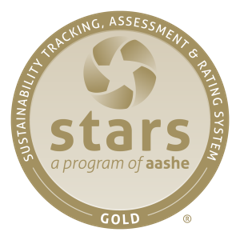About Sustainable Carolina
 Aligning UNC-Chapel Hill’s Sustainability Efforts
Aligning UNC-Chapel Hill’s Sustainability Efforts
Housed within the UNC Institute for the Environment, Sustainable Carolina is UNC-Chapel Hill’s comprehensive initiative to advance and amplify campus sustainability activities. As the hub for sustainability on campus, we connect operations, academics and research at Carolina.
- We transparently track data to report on the University’s progress as it relates to water use, greenhouse gas emissions and waste recovery.
- We engage in partnerships — both on and off campus — to understand the needs of campus and the greater community.
- We offer unique educational opportunities, allowing students to experience the living lab within and around campus.
Carbon Neutrality by 2040
When we published our 2021 Climate Action Plan, we moved our climate neutrality date up by a decade, from 2050 to 2040.
Why did we move up our date? The University outlined the original 2050 carbon neutrality date in our first Climate Action Plan, published in 2009. But in 2019, the Intergovernmental Panel on Climate Change and the U.S. Federal Government issued reports emphasizing the need for immediate climate action and the potential consequences of not taking action. The responsibility of being a leader in climate action has never been greater for Carolina than it is now.
Sustainable Carolina’s History
On Earth Day 2020, Chancellor Guskiewicz announced the creation of the Carolina Sustainability Council. Chancellor Guskiewicz chose Mike Piehler to lead the Council and serve as the University’s chief sustainability officer. Piehler’s research on human activities and ecosystem functioning, along with his experience as director of the UNC Institute for the Environment, proved beneficial in leading the Council through its first year.
In that first year, the Carolina Sustainability Council harnessed expertise in areas including solar energy, environmental finance, energy life-cycle assessment, sustainable enterprise and more.
Sustainability work is not just about an environmental ethic, it is also about operational efficiency. Reducing waste, water use and electricity consumption brings economic benefits that will help the University’s bottom line.
Michael Piehler
Sustainability Progress
Tracking Campus Sustainability Success
 As a signatory of Second Nature’s Carbon Commitment and the Alliance for Sustainability Leadership in Education’s Race to Zero initiative, we carefully track our greenhouse gas emissions. You can find our most up-to-date emissions data on the Sustainability Indicator Management and Analysis Platform, which we update annually.
As a signatory of Second Nature’s Carbon Commitment and the Alliance for Sustainability Leadership in Education’s Race to Zero initiative, we carefully track our greenhouse gas emissions. You can find our most up-to-date emissions data on the Sustainability Indicator Management and Analysis Platform, which we update annually.
We also keep a close eye on the University’s water use and waste diversion rates. We source this data from UNC Finance and Operations, which includes the UNC Office of Waste Reduction and Recycling.
UNC-Chapel Hill is certified GOLD through AASHE STARS, a Sierra Club “cool school” and a silver-ranked Bicycle Friendly University.





